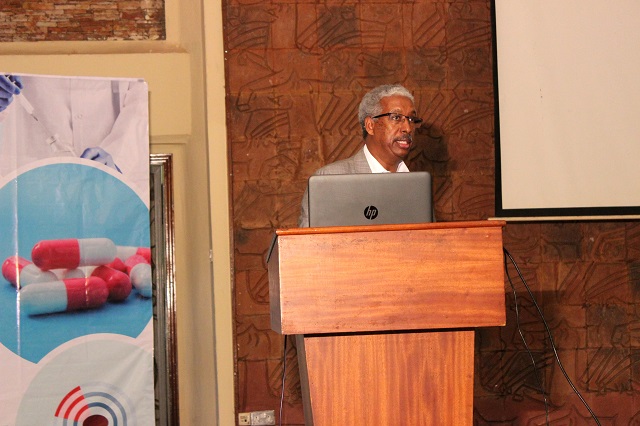
Kampala, Uganda | THE INDEPENDENT | The National Drug Authority-NDA has unveiled a new app to be used to report adverse drug reactions.
The new Med Safety Mobile App is implemented under the World Health Organization-WHO WEB-RADR project which seeks to utilize the powers of social media and new technologies for pharmacovigilance purposes.
It is a platform for the public and health workers to report reactions to drugs faster and get a response quicker where possible. The app works with both android and IOS technology, and all one requires to register a complaint is to download it, and log in using their name, physical address and contact.
A list with products registered with the National Drug Authority is provided for the complainant to select the drug they are reporting about. It also enables one to register the reactions that they got after using the drug.
The information provided goes directly to the National Pharmacovigilance Center of the National Drug Authority which records it and takes action upon assessment. A patient can be advised on what to do and where to seek help where possible.
Dr David Nahamya, the secretary to the NDA board is optimistic that the app will help them monitor the effectiveness of the drugs on the market to improve on the products offered and inform policy making. It will also help the authority to identify drugs that need to be withdrawn from the public when proven to have adverse effects.
Adverse drug effects can occur as a result of contamination during transportation or storage, poor prescription, counterfeit products and as allergies.
Last year, the National Pharmacovigilance Center received 603 reports of adverse drug reaction. Of these 60 percent came from the central region, nine percent from West Nile, eight percent from Western and eight percent from Eastern region.
Over 57 percent of the cases were serious and most reported as life-threatening. The most common reactions reported were hyperglycemia with 78 cases, liver injury with 37 cases and allergic reactions with 28 cases. The drugs that were most complained about were isoniazid with 156 reports, Dolutegravir with 152 reports and Efavirenz with 96 reports.
While most reported incidences occurred among persons aged between 45 and 64, followed by the elderly at 8 percent, children at 4 percent and infants at 1 percent. According to NDA, 53 percent of the reports came in through email, another 30 percent was done physically and a little percentage through WhatsApp.
The director Product Safety and head of the Pharmacovigilance program that deals with adverse reaction reporting Helen Ndagije says that reporting is still very low in Uganda and hopes that the App will all improve the reporting.
Africa contributes less than 1 percent of the global data on Adverse Drug Reaction. The Med Safety app has previously been launched in Burkina Faso, Zambia, Armenia, Ghana, Ethiopia and Botswana, where, according to the WHO, it has improved reporting.
Daniel Agume, a Pharmacist at Lira Regional Referral Hospital welcomed the App saying it will solve challenge associated with using books, for instance, forgetting to send the complaint after a patient has reported it, misspelling the drug and or losing the book because it has to be delivered physically.
Agume, however, asked the government to make provision for one to report reaction on other drugs including those not registered by NDA. This will help the government to get counterfeit drugs off the market or drugs that are accessible through the black market.
******
URN
 The Independent Uganda: You get the Truth we Pay the Price
The Independent Uganda: You get the Truth we Pay the Price





